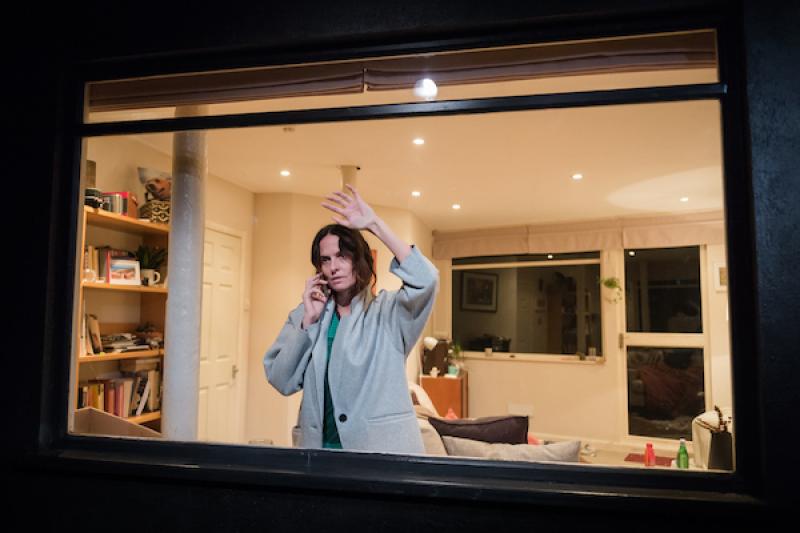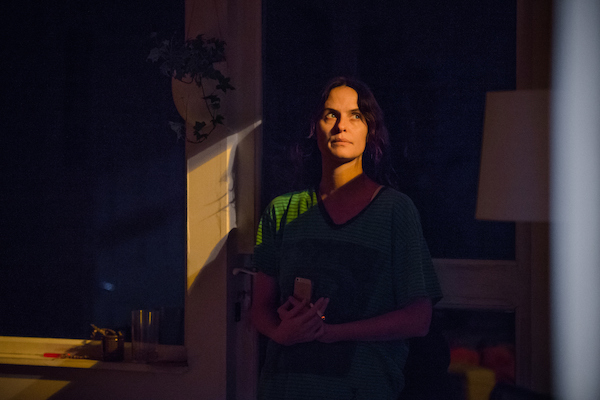The Human Voice, Gate Theatre review - unrelenting and sad | reviews, news & interviews
The Human Voice, Gate Theatre review - unrelenting and sad
The Human Voice, Gate Theatre review - unrelenting and sad
The end of the line at the end of a telephone line

It’s night, and the woman (Leanne Best) is waiting for a phone call. She’s desperate for the voice of her lover – or rather ex-lover: they split three nights ago. Both have secrets they will disclose over the course of their final conversation. Both have positions to defend. The scene is set for a coupling of melodrama and banality.
Sarah Beaton’s set reeks of suburban claustrophobia and the woman on stage is nothing special either. She’s in her pyjamas on the sofa, hair awry. The windows of her modern box-build are double glazed in plastic frames and hung with granny-beige blinds. Bland nick-nacks and tedious how-to manuals heap Ikea shelves in a room dominated by a cyclopian wide-screen TV. A small replica Rothko splashes a sick umber rectangle on a blank expanse of wall. A Lucozade bottle retorts in orange from the coffee table. The windows keep the audience out.
 The way we listen in on Best’s one-sided conversation is through headphones. It’s a gimmick (her voice carries through the set) which complicates this production’s staging and muddies its sense. If the audience can only hear Best when she’s on the phone, they are either in the position of the phone or the partner. In both instances, her ex would be audible – but as he is never heard it begs the question: why have the headphones in the first place? Their primary function seems to be to pipe Mike Winship's abstracted soundtrack through the performance which conveys what emotion should be felt when Best’s performance misses its mark.
The way we listen in on Best’s one-sided conversation is through headphones. It’s a gimmick (her voice carries through the set) which complicates this production’s staging and muddies its sense. If the audience can only hear Best when she’s on the phone, they are either in the position of the phone or the partner. In both instances, her ex would be audible – but as he is never heard it begs the question: why have the headphones in the first place? Their primary function seems to be to pipe Mike Winship's abstracted soundtrack through the performance which conveys what emotion should be felt when Best’s performance misses its mark.
It’s the first half that requires this most. Best is frantic but the monotony of her hysteria is wearing. Either it’s a feat of conscious brinksmanship with the audience’s emotional boundaries, or merely an unremitting absence of nuance. Best’s energy goes outwards, and the sense that she’s keeping things from her ex or locked in violent conflict with herself, or even hearing another voice at the end of the phone is lost in the disjointed torrent of words and cut connections and punctuated by friable “hello?!"s.
The latter half is calmer and dramatic direction is assured through a succession of disclosures which allow time for silences to expand awkwardly and tension to build. The complexities and power imbalances of their relationship emerge - only to be countered by a shocking revelation which foregrounds the ethics involved in disclosing personal vulnerabilities and the enormous power that can be mined in being utterly helpless.
Neither he nor she are particularly appealing characters – and that in itself is interesting. But when the question at the heart of the monologue – is true human contact possible when we are bodily absent – is laughably outdated by the multiplicity of connections modernity offers, the tragedy of the woman’s plea (“Yes, talk, talk, say anything, doesn’t matter what,”) is a matter of the perennial human condition rather than a function of technological alienation. What's left is the banal question of the way forward when the person most loved is also the most cruel.
- The Human Voice is at the Gate Theatre until 6 October 2018
- read more theatre reviews at theartsdesk
The future of Arts Journalism
You can stop theartsdesk.com closing!
We urgently need financing to survive. Our fundraising drive has thus far raised £49,000 but we need to reach £100,000 or we will be forced to close. Please contribute here: https://gofund.me/c3f6033d
And if you can forward this information to anyone who might assist, we’d be grateful.

Subscribe to theartsdesk.com
Thank you for continuing to read our work on theartsdesk.com. For unlimited access to every article in its entirety, including our archive of more than 15,000 pieces, we're asking for £5 per month or £40 per year. We feel it's a very good deal, and hope you do too.
To take a subscription now simply click here.
And if you're looking for that extra gift for a friend or family member, why not treat them to a theartsdesk.com gift subscription?
more Theatre
 Edinburgh Fringe 2025 reviews: Ordinary Decent Criminal / Insiders
Two dramas on prison life offer contrasting perspectives but a similar sense of compassion
Edinburgh Fringe 2025 reviews: Ordinary Decent Criminal / Insiders
Two dramas on prison life offer contrasting perspectives but a similar sense of compassion
 Edinburgh Fringe 2025 reviews: Kinder / Shunga Alert / Clean Your Plate!
From drag to Japanese erotica via a French cookery show, three of the Fringe's more unusual offerings
Edinburgh Fringe 2025 reviews: Kinder / Shunga Alert / Clean Your Plate!
From drag to Japanese erotica via a French cookery show, three of the Fringe's more unusual offerings
 The Two Gentlemen of Verona, RSC, Stratford review - not quite the intended gateway drug to Shakespeare
Shakespeare trying out lots of ideas that were to bear fruit in the future
The Two Gentlemen of Verona, RSC, Stratford review - not quite the intended gateway drug to Shakespeare
Shakespeare trying out lots of ideas that were to bear fruit in the future
 Edinburgh Fringe 2025 reviews: The Horse of Jenin / Nowhere
Two powerful shows consider the Israeli-Palestinian conflict, with mixed results
Edinburgh Fringe 2025 reviews: The Horse of Jenin / Nowhere
Two powerful shows consider the Israeli-Palestinian conflict, with mixed results
 Edinburgh Fringe 2025 reviews: The Fit Prince / Undersigned
A joyful gay romance and an intimate one-to-one encounter in two strong Fringe shows
Edinburgh Fringe 2025 reviews: The Fit Prince / Undersigned
A joyful gay romance and an intimate one-to-one encounter in two strong Fringe shows
 Tom at the Farm, Edinburgh Fringe 2025 review - desire and disgust
A visually stunning stage re-adaptation of a recent gay classic plunges the audience into blood and earth
Tom at the Farm, Edinburgh Fringe 2025 review - desire and disgust
A visually stunning stage re-adaptation of a recent gay classic plunges the audience into blood and earth
 Works and Days, Edinburgh International Festival 2025 review - jaw-dropping theatrical ambition
Nothing less than the history of human civilisation is the theme of FC Bergman's visually stunning show
Works and Days, Edinburgh International Festival 2025 review - jaw-dropping theatrical ambition
Nothing less than the history of human civilisation is the theme of FC Bergman's visually stunning show
 Every Brilliant Thing, @sohoplace review - return of the comedy about suicide that lifts the spirits
Lenny Henry is the ideal ringmaster for this exercise in audience participation
Every Brilliant Thing, @sohoplace review - return of the comedy about suicide that lifts the spirits
Lenny Henry is the ideal ringmaster for this exercise in audience participation
 Edinburgh Fringe 2025 reviews: The Beautiful Future is Coming / She's Behind You
A deft, epoch-straddling climate six-hander and a celebration (and take-down) of the pantomime dame at the Traverse Theatre
Edinburgh Fringe 2025 reviews: The Beautiful Future is Coming / She's Behind You
A deft, epoch-straddling climate six-hander and a celebration (and take-down) of the pantomime dame at the Traverse Theatre
 Good Night, Oscar, Barbican review - sad story of a Hollywood great's meltdown, with a dazzling turn by Sean Hayes
Oscar Levant is an ideal subject to refresh the debate about media freedom
Good Night, Oscar, Barbican review - sad story of a Hollywood great's meltdown, with a dazzling turn by Sean Hayes
Oscar Levant is an ideal subject to refresh the debate about media freedom
 Edinburgh Fringe 2025 reviews - Monstering the Rocketman by Henry Naylor / Alex Berr
Tabloid excess in the 1980s; gallows humour in reflections on life and death
Edinburgh Fringe 2025 reviews - Monstering the Rocketman by Henry Naylor / Alex Berr
Tabloid excess in the 1980s; gallows humour in reflections on life and death
 Edinburgh Fringe 2025 reviews: Lost Lear / Consumed
Twists in the tail bring revelations in two fine shows at the Traverse Theatre
Edinburgh Fringe 2025 reviews: Lost Lear / Consumed
Twists in the tail bring revelations in two fine shows at the Traverse Theatre
